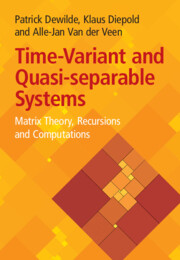Book contents
- Frontmatter
- Contents
- Preface
- Acknowledgements
- Part I Lectures on Basics with Examples
- 1 A First Example: Optimal Quadratic Control
- 2 Dynamical Systems
- 3 LTV (Quasi-separable) Systems
- 4 System Identification
- 5 State Equivalence, State Reduction
- 6 Elementary Operations
- 7 Inner Operators and External Factorizations
- 8 Inner−Outer Factorization
- 9 The Kalman Filter as an Application
- 10 Polynomial Representations
- 11 Quasi-separable Moore−Penrose Inversion
- Part II Further Contributions to Matrix Theory
- Appendix: Data Model and Implementations
- References
- Index
10 - Polynomial Representations
from Part I - Lectures on Basics with Examples
Published online by Cambridge University Press: 24 October 2024
- Frontmatter
- Contents
- Preface
- Acknowledgements
- Part I Lectures on Basics with Examples
- 1 A First Example: Optimal Quadratic Control
- 2 Dynamical Systems
- 3 LTV (Quasi-separable) Systems
- 4 System Identification
- 5 State Equivalence, State Reduction
- 6 Elementary Operations
- 7 Inner Operators and External Factorizations
- 8 Inner−Outer Factorization
- 9 The Kalman Filter as an Application
- 10 Polynomial Representations
- 11 Quasi-separable Moore−Penrose Inversion
- Part II Further Contributions to Matrix Theory
- Appendix: Data Model and Implementations
- References
- Index
Summary
Two chapters conclude the basic course.
This chapter presents an alternative theory of external and coprime factorization, using polynomial denominators in the noncommutative time-variant shift Z rather than inner denominators as done in the chapter on inner–outer theory. “Polynomials in the shift Z” are equivalent to block-lower matrices with a support defined by a (block) staircase, and are essentially different from the classical matrix polynomials of module theory, although the net effect on system analysis is remarkably similar. The polynomial method differs substantially and in a complementary way from the inner method. It is computationally simpler but does not use orthogonal transformations. It offers the possibility of treating highly unstable systems using unilateral series. Also, this approach leads to famous Bezout equations that, as mentioned in the abstract of Chapter 7, can be derived without the benefit of Euclidean divisibility methods.
Keywords
Information
- Type
- Chapter
- Information
- Time-Variant and Quasi-separable SystemsMatrix Theory, Recursions and Computations, pp. 154 - 168Publisher: Cambridge University PressPrint publication year: 2024
